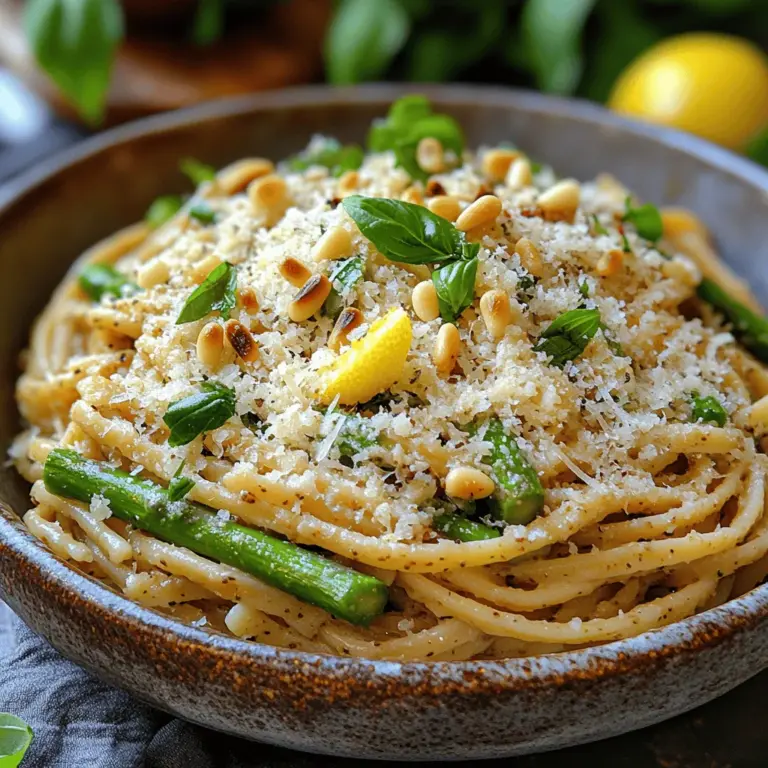In the world of culinary creations, few dishes capture the essence of spring like a vibrant asparagus pasta. This Spring Green Delight Asparagus Pasta recipe not only showcases the crispness of fresh asparagus but also incorporates wholesome ingredients, making it both nutritious and delicious. With its bright flavors, it is an ideal choice for a light lunch or a satisfying dinner. This dish is a celebration of seasonal produce, and it’s perfect for those looking to embrace lighter fare as the weather warms up.
Asparagus is often heralded as one of the first vegetables of spring, and its tender stalks provide a delightful crunch that elevates any meal. This pasta dish is not only visually appealing with its bright green hues but also packs a punch of flavor and nutrients. In this article, we will delve into the details of preparing this delightful dish, highlighting its health benefits, the importance of using fresh ingredients, and how to create a perfect balance of flavors.
Understanding the Ingredients: A Closer Look at What You’ll Need
Exploring Whole Wheat Pasta
Whole wheat pasta is the backbone of our Spring Green Delight Asparagus Pasta, offering a hearty texture and a nutty flavor that complements the vibrant vegetables. One of the primary health benefits of whole wheat pasta is its increased fiber content compared to traditional white pasta. Fiber plays a crucial role in promoting digestive health, helping to maintain steady energy levels, and keeping you feeling full longer, making it an excellent choice for anyone looking to enjoy a nutritious meal without compromising on taste.
In addition to fiber, whole wheat pasta is rich in essential nutrients such as B vitamins, iron, and magnesium. These nutrients support various bodily functions, from energy metabolism to muscle health. By choosing whole wheat over refined pasta, you not only enhance the dish’s nutritional profile but also contribute to a more balanced diet. The hearty nature of whole wheat pasta holds up well when paired with the crisp asparagus and vibrant flavors in the dish, ensuring that every bite is both satisfying and wholesome.
Highlighting Fresh Asparagus
Asparagus is the star of this recipe, bringing its unique flavor and myriad health benefits to the table. This green vegetable is low in calories but high in essential vitamins and minerals, including vitamins A, C, E, and K, as well as folate and potassium. Asparagus is also known for its antioxidant properties, thanks to compounds like saponins and flavonoids, which help combat oxidative stress in the body.
When shopping for asparagus, it’s essential to select the freshest bunches to maximize flavor and nutritional benefits. Look for firm, bright green stalks with tightly closed tips. Avoid any bunches that appear limp or have yellowing stalks, as these may be past their prime. Seasonal availability is another factor to consider; asparagus is typically at its best from late winter through early spring, making this dish a perfect way to celebrate the season’s bounty.
The Role of Olive Oil and Garlic
No pasta dish is complete without the rich flavors of olive oil and garlic. Extra virgin olive oil is not only a staple in Mediterranean cuisine but also a source of healthy monounsaturated fats, which can promote heart health and reduce inflammation. Its distinct flavor enhances the overall taste of the dish, providing a smooth richness that beautifully complements the asparagus.
Garlic, on the other hand, is a culinary powerhouse known for its anti-inflammatory and immune-boosting properties. When sautéed, garlic releases its aromatic oils, infusing the dish with a fragrant warmth that elevates the overall flavor profile. Together, olive oil and garlic form the foundation of our sauce, creating a savory base that allows the freshness of the asparagus to shine through.
The Zesty Touch of Lemon
To bring a refreshing brightness to the Spring Green Delight Asparagus Pasta, we’ll incorporate lemon zest and juice. The bright acidity of lemon enhances the natural flavors of the vegetables, providing a counterbalance to the earthiness of the asparagus. Lemon is also rich in vitamin C, which supports immune function and adds an invigorating touch to the dish.
When using lemon in your cooking, it’s important to select fresh lemons for the best flavor. The zest, which is the outer yellow skin, contains flavorful oils that can significantly enhance the dish. A simple twist of lemon zest before serving can elevate the entire meal, providing a vibrant finish that tantalizes the taste buds.
The Importance of Herbs and Cheese
To round out our Spring Green Delight Asparagus Pasta, we’ll add fresh herbs and a sprinkle of Parmesan cheese. Fresh basil is a classic pairing with asparagus, offering a sweet, aromatic flavor that complements the dish beautifully. Not only does basil add color, but it also brings additional health benefits, such as anti-inflammatory and antioxidant properties.
Parmesan cheese, with its nutty, salty flavor, creates a delightful contrast to the fresh ingredients while adding a creamy richness that binds the dish together. This cheese is packed with protein and calcium, making it a nutritious addition that enhances the overall taste and texture. Grating fresh Parmesan over the finished dish provides a finishing touch that adds depth and indulgence to your pasta.
Step-by-Step Preparation: Crafting Your Spring Green Delight Asparagus Pasta
Now that we have explored the ingredients and their benefits, it’s time to dive into the cooking process. Preparing your Spring Green Delight Asparagus Pasta involves several key steps, each designed to maximize flavor and texture.
Cooking the Whole Wheat Pasta
The first step in creating your pasta dish is cooking the whole wheat pasta to perfection. Begin by bringing a large pot of salted water to a rolling boil. Salt is essential not only for flavoring the pasta but also for enhancing the overall taste of the dish. Once the water reaches a boil, add the whole wheat pasta and cook according to the package instructions, usually around 7-9 minutes, depending on the brand and type.
To achieve that ideal al dente texture, taste the pasta a minute or two before the suggested cooking time is up. Al dente pasta will have a slight bite to it, which helps it hold its shape when combined with the sauce. Before draining the pasta, be sure to reserve about a cup of the pasta cooking water. This starchy water will be invaluable for adjusting the sauce’s consistency and ensuring that all the flavors meld beautifully.
Blanching Asparagus for Optimal Texture
While the pasta is cooking, prepare the asparagus. Begin by rinsing the spears under cold water to remove any dirt or debris. Trim the tough ends of the asparagus, about an inch from the bottom, as this part can be woody and unpalatable.
To preserve the vibrant green color and nutrients of the asparagus, use the blanching technique. Fill a large pot with water and bring it to a boil. Once boiling, add the asparagus spears and cook for about 2-3 minutes, just until they turn bright green and are slightly tender but still crisp.
Immediately transfer the asparagus to a bowl of ice water using a slotted spoon. This ice bath will stop the cooking process, helping to maintain the asparagus’s color, crunch, and nutritional value. After a minute or two in the ice bath, drain the asparagus and set it aside.
Creating a Flavorful Sauce
With the pasta cooked and the asparagus blanched, it’s time to bring everything together in a flavorful sauce. In a large skillet, heat a couple of tablespoons of extra virgin olive oil over medium heat. Once the oil is warm, add minced garlic and sauté for about 30 seconds, or until fragrant. Be careful not to let the garlic brown, as it can turn bitter.
Next, add the blanched asparagus to the skillet, tossing it gently to coat it in the garlic-infused oil. This step will help infuse the asparagus with the rich flavors of the garlic and olive oil. If desired, add a splash of the reserved pasta water to the skillet; this will help create a light sauce that clings to the pasta.
Once the asparagus is warmed through, add the drained whole wheat pasta to the skillet. Toss everything together, ensuring that the pasta is evenly coated with the olive oil and garlic. If the mixture appears dry, add more reserved pasta water, a little at a time, until you achieve the desired consistency.
Finally, squeeze fresh lemon juice over the pasta and sprinkle in the lemon zest, tossing to combine. The citrus will brighten the dish, elevating the flavors and making the asparagus shine. Taste the pasta and adjust the seasoning with salt and pepper as needed.
—
This first part of the Spring Green Delight Asparagus Pasta recipe has laid the groundwork for a dish that embodies the freshness of spring. With its wholesome ingredients and straightforward preparation, this recipe promises to be a delightful addition to your mealtime repertoire. In the following sections, we will delve into additional tips for achieving the best results, answer common questions, and explore more ways to enjoy this vibrant dish.
{{image_2}}
Sautéing Garlic and Incorporating Asparagus and Spices into a Cohesive Sauce
To create the flavorful base for your Spring Green Delight Asparagus Pasta, begin by heating a large skillet over medium heat. Add a couple of tablespoons of extra virgin olive oil, allowing it to warm up for about a minute. Once the oil is shimmering but not smoking, it’s time to sauté the garlic.
Sautéing Garlic:
Add 3-4 cloves of minced garlic to the skillet. Sauté for approximately 1-2 minutes, stirring frequently to prevent burning. The goal is to release the garlic’s aroma and flavor while achieving a light golden color. Be mindful not to let it turn too brown, as this can impart a bitter taste to your sauce.
Incorporating Asparagus:
Next, introduce your prepared asparagus to the skillet. If you haven’t already, cut the asparagus into bite-sized pieces, about 1-2 inches long (you can also keep them whole if you prefer). Add them to the skillet and toss them with the garlic. Season with salt and freshly cracked black pepper to taste. Sauté the mixture for 4-5 minutes, or until the asparagus is tender but still crisp. This step is crucial, as it ensures that the asparagus retains its vibrant green color and nutrients.
Adding Spices:
To elevate the dish, add a pinch of crushed red pepper flakes for a hint of heat and a teaspoon of lemon zest to brighten the flavors. Toss everything gently to combine, allowing the spices to infuse into the vegetables.
Combining Pasta and Sauce: Achieving the Perfect Creamy Texture
Now that your asparagus and garlic are perfectly sautéed, it’s time to marry this vibrant mixture with your pasta. First, ensure that your pasta is cooked al dente according to package instructions. Reserve about 1 cup of the pasta cooking water before draining the pasta. This starchy water will be instrumental in achieving a creamy sauce that clings beautifully to the pasta.
Mixing Pasta with Sauce:
Once the pasta is drained, add it directly to the skillet with the sautéed asparagus and garlic. Toss the pasta gently to coat it in the aromatic mixture. Gradually pour in some of the reserved pasta water—start with 1/4 cup and add more as necessary. The heat from the skillet will help to emulsify the pasta water with the olive oil, creating a silky sauce that envelops the pasta.
For a creamier texture, consider incorporating a few tablespoons of heavy cream or a plant-based alternative if you prefer a vegan option. This step is optional but recommended if you desire a richer mouthfeel.
Finishing Touches: Enhancing Flavor and Presentation
With the pasta and sauce combined, it’s time to add the finishing touches that will elevate your dish both in flavor and presentation.
Adding Parmesan and Basil:
Remove the skillet from heat and stir in freshly grated Parmesan cheese, about 1/2 cup, while the pasta is still warm. This will melt the cheese and create a deliciously cheesy coating for your pasta. If you are making a vegan version, you can substitute nutritional yeast for a similar cheesy flavor without the dairy.
Next, fold in a handful of fresh basil leaves, roughly torn to release their fragrant oils. The basil not only enhances the dish’s flavor but also adds a pop of color that makes the dish visually appealing.
Presentation Tips:
To serve, dish out the pasta into individual bowls or a large serving platter. Drizzle a little extra virgin olive oil over the top for added richness and garnish with a sprinkle of more Parmesan cheese and fresh basil leaves. Consider adding a few slices of lemon on the side for a fresh citrus squeeze right before enjoying. This not only enhances the flavor but also adds a vibrant touch to your presentation.
Nutritional Benefits: Why Spring Green Delight is a Healthy Choice
Highlighting Nutritional Content
The Spring Green Delight Asparagus Pasta is not just a feast for the eyes; it’s also packed with nutrients.
– Asparagus is rich in vitamins A, C, E, and K, and it’s a great source of fiber. Fiber is essential for digestive health, helping to maintain regularity and prevent constipation.
– Garlic not only adds flavor but also has numerous health benefits, including potential anti-inflammatory and immune-boosting properties.
– Whole grain pasta provides complex carbohydrates and additional fiber, contributing to a feeling of fullness while providing sustained energy.
When you combine these ingredients, you create a balanced meal that nourishes your body while delighting your taste buds.
The Importance of Seasonal Eating
Eating with the seasons is a practice that brings numerous benefits. When you choose seasonal produce like asparagus, you’re not only enjoying the peak flavor and freshness, but you’re also supporting local farmers and the environment. Seasonal foods require less transportation and storage time, which can reduce their carbon footprint. Plus, they are often more nutrient-dense, as they are harvested at their peak ripeness.
Health Benefits of Whole Foods
Incorporating whole foods into your diet, as demonstrated in this recipe, can lead to numerous health benefits. Whole foods are minimally processed and are typically higher in nutrients compared to their refined counterparts. They provide essential vitamins, minerals, and antioxidants that are crucial for overall well-being. By focusing on whole foods, you lower your intake of unhealthy additives and preservatives, contributing to better health outcomes over time.
Serving Suggestions: Elevating Your Meal Experience
Pairing with Complementary Dishes
To elevate your dining experience, consider serving your Spring Green Delight Asparagus Pasta alongside complementary dishes. A simple side salad with mixed greens, cherry tomatoes, and a light vinaigrette can add freshness and crunch to your meal. Alternatively, roasted vegetables or a light soup, such as a tomato basil, can round out the meal beautifully.
For those looking for a heartier option, grilled chicken or shrimp can be excellent additions, providing protein that pairs well with the pasta’s vibrant flavors.
Wine Pairings
When it comes to pairing wine with your asparagus pasta, opt for a light, crisp white wine. A Pinot Grigio or Sauvignon Blanc complements the freshness of the asparagus without overpowering the dish. These wines enhance the delicate flavors while providing a refreshing contrast, making for a delightful dining experience.
Conclusion: A Celebration of Fresh Flavors and Healthy Eating
In conclusion, the Spring Green Delight Asparagus Pasta is more than just a meal; it’s a celebration of spring and a testament to the beauty of fresh, whole ingredients. This dish not only nourishes the body but also delights the senses with its vibrant colors and flavors. Whether you’re enjoying it on a sunny day or sharing it with loved ones, this recipe is sure to become a staple in your culinary repertoire.
Embrace the joy of cooking with fresh ingredients and savor the delightful experience that this dish offers. By choosing seasonal produce and whole foods, you are not only enhancing your health but also enjoying the rich flavors that nature has to offer. So gather your ingredients, follow the steps, and treat yourself to a plate of Spring Green Delight Asparagus Pasta—your taste buds and body will thank you!


